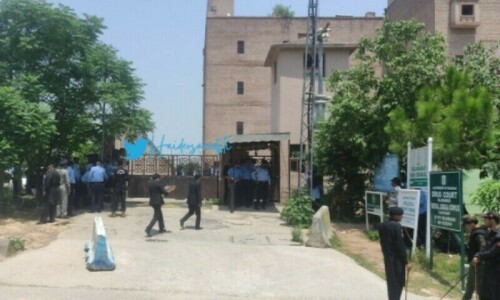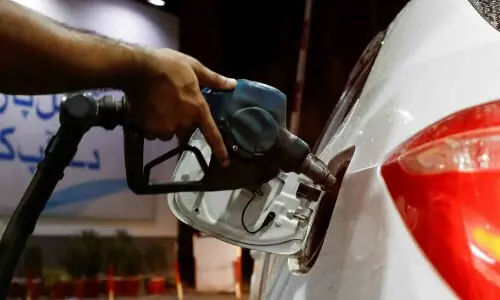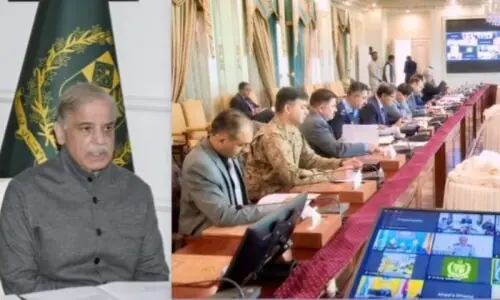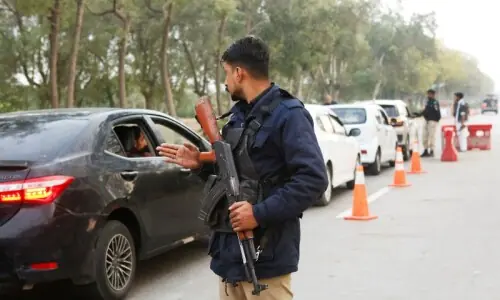Special Court Judge Abual Hasnat Zulqarnain, who is hearing the cipher case against PTI Chairman Imran Khan, ruled on Tuesday that the trial proceedings would continue at the Adiala jail but in an open court.
Citing “serious security risks”, Adiala jail authorities failed to present the former premier today before the special court at Islamabad’s Federal Judicial Complex (FJC) as per the orders of the same court’s judge.
Last week, Judge Zulqarnain had issued directives that the PTI chief and former foreign minister Shah Mahmood Qureshi be presented at the FJC.
The cipher case pertains to a diplomatic document that the Federal Investigation Agency’s charge sheet alleges was never returned by Imran. The PTI has long held that the document contained a threat from the United States to oust Imran as prime minister.
The former premier and his aide Qureshi, who is also behind bars, were indicted in the case on Oct 23. Both have pleaded not guilty.
The trial was being held at Adiala Jail and four witnesses had already recorded their statements, with the fifth being cross-examined when an Islamabad High Court division bench had termed the government’s notification for jail trial “erroneous” and scrapped the entire proceedings.
As a result of the judgement, the special court would now start a fresh trial while the prosecution would have to file a fresh application to conduct the trial in jail.
Police, administration and other departments concerned were to meet on Monday to finalise a security plan for Imran’s appearance.
Today, Judge Zulqarnain presided over the hearing at the FJC, where Barrister Salman Safdar appeared as Imran’s counsel while Advocate Ali Bukhari was present as Qureshi’s lawyer. The FIA’s prosecutors Shah Khawar and Zulfikar Abbas Naqvi also appeared before the court.
During the hearing, the jail authorities submitted their report to the court, which Judge Zulqarnain reviewed.
According to reports by intelligence agencies and the police, the PTI chairman faces life threats, the report stated. It further said, “It has been informed that the PTI chairman faces security risks of a serious scale”.
Safdar urged the court to adjourn the hearing indefinitely and grant his client bail while Qureshi’s counsel Bukhari requested the court to issue directives for his client to be presented before the court.
After a brief while, the special court announced its order on the report submitted by the jail officials, approving the jail trial but saying it would be held in an open court.
The court noted that the jail authorities and security agencies had expressed their reservations about holding the trial at the FJC. Therefore, the next hearing would be held at the Adiala jail and would be an open court, the order stated.
The special court stated that those who wished to attend the proceedings would not be stopped from doing so and that journalists would also be permitted to witness the trial.
It further said that five family members of each suspect would also be allowed inside the courtroom. The hearing was adjourned till Dec 1 (Friday).
Speaking to the media outside the court, Imran’s sister Aleema Khanum and Qureshi’s daughter Meher Bano Qureshi said the family members of the two were greatly saddened that the PTI leaders were not brought to court.
Commenting on the reasoning provided by jail officials for not presenting the PTI leaders, Khanum wondered if the president and the prime minister could wander the streets and be provided security then why could the same not be done for the former premier and foreign minister.
“The order given by the judge today [has effectively] turned into a jail trial again and the only reason is that they (Imran and Qureshi) can not get out in the future.
“If this is the only way, then we don’t think the two will be allowed to get out of jail for many months. Excuses are being made to keep them in jail,” she said. Khanum also called on all the media to be present at the next hearing.
On the other hand, Meher Bano said the families had the same rights that their relatives be provided security and brought to court.
“You should ask the question that why are they not being brought to court? The case is the same … so what will happen if [the two] are brought here? What are they afraid of? What will happen if the people see their faces? Will they gain the courage to ask questions? We are still asking questions right now,” she said.
The hearing
At the outset of the hearing, Safdar informed the court that there were “two separate matters” pending before the court for today.
“We had hoped that the PTI chairman would be presented before the court today but he has not been yet,” the lawyer lamented.
During the hearing, the jail authorities submitted their report to the court, which Judge Zulqarnain reviewed. The judge then said, “The jail officials are saying that he (Imran) cannot be presented.”
According to reports by intelligence agencies and the police, the PTI chairman faces threats to life, the report stated. It further said, “It has been informed that the PTI chairman faces security risks of a serious scale”.
The jail officials then informed the court they had written a letter to the Islamabad police, requesting additional security. The police’s report was also submitted to the court along with the jail’s.
Here, Safdar said it was the “jail authorities’ responsibility to present the suspect before the court” and that they could not “ignore” doing so. The counsel then read aloud the Islamabad High Court’s order wherein it had declared Imran’s jail trial “null and void”.
The lawyer stated that he had been requesting the court to “first decide where the trial would be held” but was asked whether there was a “stay order whenever I said something”.
“However they do, they must present the PTI chairman [before the court] today,” Safdar insisted. “On what intelligence agency’s basis are they saying that there are threats to his life? When we used to say his life is in danger, we were told to reach anyways.”
The counsel asserted that the IHC’s and the special court’s orders were being violated.
The lawyer then read out the report, which stated that the capital police had written a letter to the jail officials, apprising them of security risks. He then asked why Qureshi was not presented yet as the letter was only limited to Imran.
“If there are security threats, then please adjourn this hearing for an indefinite period. If the case cannot proceed in jail [and] they (jail officials) are not willing to proceed it here, then the suspect may be given bail,” Safdar said.
At this point during the hearing, Qureshi’s lawyer Bukhari began presenting his arguments. He noted that Khawar, the FIA prosecutor, had “read the jail superintendent’s letter himself”, and asked why his client had not been presented before the court.
“Neither has any charge been framed yet, nor has any copy [of charge sheet] been distributed. Then why has he been kept inside [the jail]?” the counsel asked.
Bukhari then urged the court to issue directives for his client to be presented before the court, emphasising that it was “necessary” to present the suspect in an open trial and a “legal responsibility” to do so.
“It is the court’s responsibility to ensure the suspects’ production before the court,” he argued. “If court orders are not obeyed, you have the authority to send government officials to jail,” the advocate said while addressing the judge.
Judge Zulqarnain then said he would issue an “appropriate order” on the matter. He asked whether the court had summoned the suspects, to which an FIA prosecutor replied in the affirmative.
“No matter how many notifications you bring, it does not matter. The public and the media should have access to the court,” the judge observed.
He then asked, “I am using the word “wish” that whoever wishes to hear the case, can we allow them?” At this, Barrister Safdar said, “Who is the jail superintendent to decide on your behalf?”
To this, the FIA prosecutor asserted that a jail trial could be held “while fulfilling all legal requirements”. He argued that the IHC had not declared the special court’s proceedings “illegal”.
He further said it was up to the court to decide where the trial would be held and how many people would be permitted inside the courtroom in the case of a jail trial.
At this point during the hearing, Judge Zulqarnain said, “It does not matter to the court where the trial is held. The court wants that for those who want to attend the trial, what can be done for them?”
The judge observed that Section 352 must be followed and that there was no compromise on that. Barrister Safdar then urged the court that either Imran be presented or “action be taken against those responsible”.
Here, Advocate Iskander Zulkarnain Saleem, a PTI lawyer, asserted that upon court orders being violated, the respective inspector general of police should be summoned. He argued it was “not the FIA prosecutors’ duty to give explanations”.
The FIA prosecutor then informed the court that they had “no relation” to the communication taking place between the law enforcement agencies and the jail superintendent.
Subsequently, the court reserved its order on the jail report and the mode of holding the trial going forward.






























